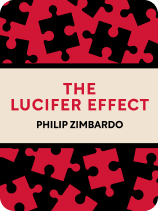

This article is an excerpt from the Shortform book guide to "The Lucifer Effect" by Philip Zimbardo. Shortform has the world's best summaries and analyses of books you should be reading.
Like this article? Sign up for a free trial here .
Are humans inherently good or evil? Does our environment shape who we are?
In The Lucifer Effect, psychologist Philip Zimbardo argues that humans aren’t born good or bad. Instead, he theorizes that certain circumstances can cause any good person to become evil.
Learn more about why Zimbardo believes humans aren’t inherently good or evil.
The Theory of Fixed Morals vs. Circumstantial Morals
Are humans inherently good or evil? Zimbardo argues that any one of us could commit the worst evil imaginable if we found ourselves in the wrong situation. (We’ll call this the “theory of circumstantial morals” because it implies that each individual’s moral compass can change rapidly in response to new circumstances.)
In other words, humans aren’t inherently bad. Zimbardo argues that evildoers are ordinary people who find themselves in situations that cause them to disengage their normal sense of morality. Interviews have confirmed that many people who do great evil—terrorists, torturers, those who facilitate genocide—are otherwise psychologically healthy and rational. They’re just like any of us.
The theory of fixed morals (that humans are either born good or bad) isn’t just a popular idea. We’re hardwired to believe it because the human brain is biased against the theory of circumstantial morals. In psychology, the fundamental attribution error is when we apply the theory of fixed morals to the behavior of others (by blaming their immoral behavior on their character rather than the environment). Why do we hold this bias so deeply?
Why We Believe in the Theory of Fixed Morals
First, Zimbardo explains that we believe this theory because it’s simpler—viewing people as either good or evil makes the world much easier to understand, even if it’s not true. Second, this bias protects our ego by identifying evil as something separate from ourselves. The theory of fixed morals allows us to blame all of the world’s evil on the few villains and criminals who are directly involved in it. On the other hand, if we embrace the theory of circumstantial morals, we may have to accept responsibility for creating or prolonging the circumstances that influence people to do evil.
The theory of circumstantial morals does not excuse evil—he still believes that we should hold people accountable for their harmful actions. However, it should influence us to punish them less severely. We should also extend justice to those responsible for creating the broader circumstances in which the evil took place. In other words, Zimbardo asserts that we can more accurately identify the source of evil and prevent it by overcoming the fundamental attribution error.
The Theory of Fixed Morals May Encourage Virtuous Action
While Zimbardo argues that the theory of fixed morals is an irrational bias and a harmful oversimplification, some make the case that when we apply it to ourselves, the theory of fixed morals can motivate us to do good. If we truly believe humans are inherently good—fundamentally different from those who are evil—we’ll want to avoid contradicting that belief with our actions.
For example, Calvinists believe they’re predestined to go to heaven because God has already chosen them to be righteous people. At first, it doesn’t seem like this would motivate them to do good—if they’re predestined for salvation, why wouldn’t they do whatever they want?—but in practice, Calvinists want to behave by their self-identity, so they follow their doctrine’s moral laws.
However, you could still argue that the opposite is true: If we believe that humans are inherently good and the flaws in our nature don’t exist, we won’t take steps to fix them. One example of this kind of self-blindness is Zimbardo’s point that the theory of fixed morals motivates us to deflect blame for the world’s evil away from ourselves.

———End of Preview———
Like what you just read? Read the rest of the world's best book summary and analysis of Philip Zimbardo's "The Lucifer Effect" at Shortform .
Here's what you'll find in our full The Lucifer Effect summary :
- How ordinary people can turn into heartless killers
- Insights and criticisms of the Stanford Prison Experiment
- Tips on how to resist circumstantial influences






